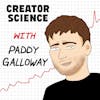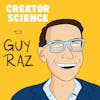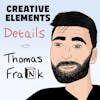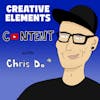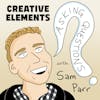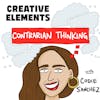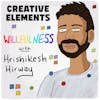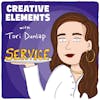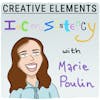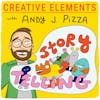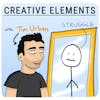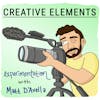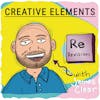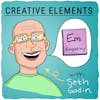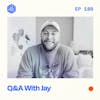
#180: Q&A With Jay – Talking about money, managing your time, and trends that I’m seeing.
Play EpisodeAnswering questions from listener like YOU.
You may have heard me say recently that one of my 2024 priorities for this show, the audio show in particular, is to split the recordings about 50/50 between guest interviews and solo episodes.
I have been getting such positive feedback on episodes of the show where it's just me doing Q&A or breaking down a specific topic and sharing how I think about it.
So today, I'm going to do one of those solo episodes. I have a lot of questions today submitted on Twitter, LinkedIn, and Threads, so we will go through as many as we can.
Free professional creator crash course
Listen to my recent Mailbag episode
Full transcript and show notes
***
CONNECT
📬 Subscribe to Creator Science
🙏 Make a guest or mailbag request
📝 Check out our curated Playlists
***
SPONSORS
💼 View all sponsors and offers
***
SAY THANKS
💜 Leave a review on Apple Podcasts
Learn more about your ad choices. Visit megaphone.fm/adchoices
ay Clouse [00:00:13]:
Hello, my friend. Welcome back to another episode of Creator Science. It is snowy here in Ohio. I am cozy in my studio, and I'm breaking one of my own cardinal rules, which is I am drinking my coffee while I am recording I don't know how much recording you do of your voice on microphone but I have noticed that when I drink coffee, I get a little bit smacky and that's a word that I learned from LinkedIn Learning describe I don't know. There there there's a whole plethora of mouth sounds that happen in the world of audio recording. And smacky is when Things just feel a little sticky. A little the saliva is thick. Anyway, coffee is usually a A culprit of that, but I wanted to be comfortable.
Jay Clouse [00:01:00]:
I wanted to relax a little bit, enjoy myself, enjoy my morning coffee, and bring you this episode. Now you may have heard me say recently that in 2024 one of my priorities for this show the audio show in particular is to Split the recordings about 5050 between guest interviews and solo episodes. I have been getting such positive feedback on episodes of the show where it's just me doing q and a as I'm going to do today or, kind of breaking down a specific topic and sharing how I think about it. So today, I'm gonna do one of those solo episodes, and I'm excited for it. I have a lot of questions today submitted on Twitter and LinkedIn and threads. So we will go through as many as we can starting with this Spicy question from my friend, Joe Casa Bono, who says, how do you feel your posts where you explicitly talk about how much money you make form, engagement wise, and perception wise, and why do you think that is? I will jump into that question right after this. Okay. Welcome back.
Jay Clouse [00:02:06]:
Once again, Joe's question to kick us off here today. How do you feel your post where you explicitly talk about how much money you make perform in terms of engagement and perception, And why do you think that is? I have strong opinions on this. I've talked about it a little bit in the past, but it is undeniable that when I Share specific numbers in terms of how much I earn through this product or that product or on a monthly basis or an annual basis. They typically perform well engagement wise like they get more impressions they get more engagement they get more reach and I don't love talking about that anymore because what I've realized is That type of post creates envy in the people who see it. It's very easy to make those posts and think, I am so good at capturing and attracting attention I am a genius I am so good at this game and so you just keep doing it and in a way it it works it perpetuates but it's not a good thing for the world now there's an argument to be made which is is it A good thing for good people to use whatever means necessary for a greater good and I have to ask myself that sometimes is it is it worth doing tactics that I don't love because That is a proven way to get the message out there and help more people. And I think there is some truth to that, but I'm using it less and less often Because the feeling of envy is not one that I enjoy, and it's not one that I wanna create in people. You know? I I don't want people to See numbers instantly compare themselves to those numbers because that's what we do. We compare our own success to the success of others, and we benchmark ourselves.
Jay Clouse [00:04:05]:
We compare ourselves. It's not a kind thing to do, especially the more successful you become. So I think they perform well, Joe, engagement wise, but perception wise, I think it's becoming increasingly less appreciated as well. I think people are like, quit talking about this. But with so much noise out there, we need some sign for who do I take seriously who do I listen to whose advice do I want to follow whose perspective do I want to hear and we typically based the answer of that question in well who has the things or has achieved the things that we want and so when we see Our aspirational results achieved by other people, it makes us more likely to listen to that other person, especially if they're saying, and here's how you can do it too. But, I I just don't know if that's the relationship I want with people long term But if I'm not gonna use specific numbers, it really becomes a question of how do I get my signal out above the noise so that people know they can they can trust me, and I have something that can help them. Okay. One last thought on this question.
Jay Clouse [00:05:23]:
I know I'm spending a lot of time on this question in particular, but it's something I've been thinking about a lot lately. I also believe that a lot of people Love to see other people fall from grace or from the mountaintop. I don't know what it is about human I think it's human nature I don't think it's anything about the culture right now but I think there's a part of us that indulges in this shot in Freud of seeing somebody who has achieved something then fall from grace, because it makes us feel better. So the more You talk about your numbers, your success. Even if that performs well, I think it creates an appetite in others to see you fail. Like, they want to see you fall from that because that reduces the envy you have built up in them. So, You know, I wanna be somebody that people wanna keep rooting for, that people want to see be successful. And I don't know if talking about how much money you make over the long term is going to do that our next question comes from Alex Hillman on Twitter He says what parts of the work do you dislike the most and how do you get them done anyway I think the tendency as time goes by is to make things more complex to add to the business, and everything you add has Greater implications than you initially realize.
Jay Clouse [00:06:56]:
So when you, you know, add in okay. I think I'm gonna do sponsorship in my business now. That's not just accepting payment and suddenly there's sponsorship in your newsletter. That's actually adding a whole host of things, which is, a process for collecting payment, a process for getting a creative brief, a process for getting that brief, approved and then communicating with the sponsor all along the way and after the spot has run. So, you know, we think we're making Small additions to our business but there tends to be a lot of implications to that and a lot of it is administrative so a lot of the work that I don't enjoy doing is administrative work not because the work itself sucks or is hard it's usually like very simple fairly quick but It just adds up. You know? I woke up this morning, and I had an email from Gusto that says, hey. Time to run payroll. Well, to run payroll, I first had to do my Profit First, accounting process, then I ran payroll, then I, did the process of submitting funds to my 401 k then I paid the contractors you know these are all small easy administrative things but they add up to like an hour of time here and there and it's that's twice a month there's just a whole host of things like that so on the administrative front how do I get those things done well for 1 I just hired my wife into the business and now we are we are partners in creator science And her title is general manager.
Jay Clouse [00:08:33]:
She's gonna be doing all things operations. Now I'm gonna have to do a lot of, Teaching to show her how things are done currently, and then she's gonna make those processes better. But, ultimately, I hope that removes some cognitive load so that you know I'm not looking at the email for oh wait does this does this trigger some administrative action I have to do now that can be her job she's the one accountable and responsible for that so hiring is one way to get it done The other thing I find is there are different types of energy that I feel throughout the day. In the morning, I typically like to do whatever creative work I have the most energy for because I have more focus more enthusiasm in the morning and as the day goes by I have less mental sharpness I have less creativity and so administrative tasks can kind of fall towards the end of So you've gotta understand your own rhythms and what type of energy this task requires so that you are matching The type of work that needs to be done to the time of day that it makes the most sense or, you know, the day of the week. Sometimes you can theme your days to say, Tuesday's an administrative day or for me, Tuesdays and 30 Thursdays are calls days I have no expectation I'm gonna get any creative work done on Tuesdays Thursdays I'm just talking to people Monday Friday, those are creative days, and Wednesday is kind of an administrative day. So it's mostly administrative Administrative stuff, response stuff. Increasingly, like, anything that's not creative work, I have less interest in. But, you know as the business has gotten more complex there are a lot of aspects to the business that are not creative outside the creative work is actually the minority of things that need to be done.
Jay Clouse [00:10:23]:
Our next question comes from caazeltein on Twitter. Azeltine, Azeltine. He says how do you spot a video that will do well what are the things that signal to you this one will work and what are some examples of misses you called and what would have made them take off This is so hard. I mean, I'm I'm going to assume he's talking about YouTube here, but, you know, a video that will do well, We have some expectation that every video we publish will do well because now we have a filter on the front end to say, if we don't believe this can do well, We're not gonna make the video. So it's it's really being in tune with our core audience, first and foremost in saying what do they need what video doesn't exist and would they trust from us but on YouTube you do really also have to think about the broader viewers people who have never discovered you before what would they find interesting if it showed up in their recommended feed and it's it's it's really tough you know I I more and more try to lean into Assuming a lot of intelligence in our potential audience, in our current audience, and saying, if I'm curious about this, I think the audience will be curious about this too. But some videos just don't hit at all. You know? We interviewed Masayr Yacine A few months back, he has a huge audience. I thought having his name, his face, and the thumbnail would be really good for us.
Jay Clouse [00:11:50]:
That video bombed. We recently had Angus Parker on love that video I think it's very in-depth very specific very tactical I think it's great for hiring But Angus's face is behind the scenes of Ali Abdaal's business so you know that thumbnail is not as clickable as we would think we put in the thumbnail initially and that didn't do as well as we thought it would so it's really really tough what I do do is I keep a close eye on our metrics shortly after releasing the video. Now take this with a grain of salt because Connor, my producer, doesn't see this the same way that I do, and he knows YouTube better than I do. But I I look at YouTube through this the lens that I look at most platforms, and so I'm looking for patterns. And we release the video, I am looking at what is the immediate click through rate on that video because I have yet to see a video we release That starts with a very low click through rate that then becomes a high click through rate within a matter of hours. Typically the sample size we get quickly holds true and is usually like a best case scenario you know usually click through rate goes down over time so when we release a video I'm seeing how well is this package performing right now And I can tell pretty early on usually, like, is this is this gonna fly? But that's not super helpful from the beginning. You know? From the beginning, We are trying to create a package that we think is interesting to a YouTube audience in particular or, a group of people on YouTube. And it's you know, some people would say there are a couple things you can do to to give yourself a better shot like there's this term buckets that we learned from Patty Galloway and it's this idea that on your channel if you have a type of video that performed well what if you create a variant of that type of email so an example of this would be like a versus video series mr.
Jay Clouse [00:13:52]:
Beast does a lot of these like $1 yacht versus $1,000,000,000 yacht. You can take that format and say $1 meal versus $10,000 meal and and and think, well, this is a bucket. This verse's format is a bucket. Some channels are like, I snuck into, this this place, and that's a bucket for their channel another example would be Noah Kagan you know he does a lot of I asked billionaires their greatest regret I asked billionaires how they made their money I asked billionaires if it was worth it that's a content bucket when that performs well you have a good Expectation that the next one will perform well also. You don't even have to look at your own videos to discover buckets that work well. You know, you could look at what Noah's doing and saying, okay. Asking millionaires is an interesting idea. Maybe I will do Asking veterinarians, asking teachers, asking whatever, or take that same versus type of bucket this versus that you can do that on your channel so generally doing some research of seeing what type of videos are doing well right now in the culture 4 different channels doing your own spin on it that can work well But, really, again, it all comes down to the package.
Jay Clouse [00:15:08]:
Do you have a title and thumbnail that is more interesting, more clickable than the 7 or 9 other packages on the recommended page right now. It's a hard game to play. It's a really hard game to play, but you've gotta look at that we use something called thumbnail preview .com I think let me yeah thumbnail preview .com We take our proposed title, our thumbnail, and it creates a mock up of here's what that title and thumbnail looks like against other real videos on YouTube. Does this package seem clickable. And that's helped us quite a bit. Next, Roberto Blake asked, what are the myths that hold creators back? And I have a few on my mind. One of them is I'm too late. I hear this all the time, and I I've thought it myself.
Jay Clouse [00:15:54]:
You know? It is too late for me to dive in and do this platform or do this thing or become a creator just not true there are people breaking through every single day people getting started every single day The only thing that idea of I'm too late will do is further delay you. And then, you know, a year from now, you look back and be like, gosh, I wish I would have started a year ago. So that's the number 1 myth, I think, that holds people back. I also think people will make declarations like, Email is dead. Podcasting is dead. This platform is dead. That platform is dead. Also, almost never true.
Jay Clouse [00:16:31]:
What that usually means is the current or most recent meta is dead meta meaning what is the macro trend for how this platform is used so on on Twitter probably a year or 2 ago it was really popular to templatize Certain tweet hooks that were doing well and write your own. That meta is dead right now. Twitter is down, but I don't think Twitter is dead. I think these platforms go through cycles of here is what can become new and popular on this platform right now or probably more accurately said the stuff that has been working is no longer working so we have to find the new meta the new thing that works well but thinking that a platform is dead is is not helpful and usually that moment where people think Things are dead is a time when there's opportunity for a new content type to take hold. The last 1 I'll throw out is this myth that you have to be Everywhere at once, everywhere all the time. It's just not practical. Unless you have a huge team and or great processes, there's just no way that you can be on all the platforms all the time and be successful on all of them it takes time to build up to that place and again it's you're really crushing that and then add on new platforms. Jovan asked for some tips for starting a podcast on YouTube.
Jay Clouse [00:18:05]:
How do you find your guests? What is your preparation for podcast episodes and any successes and challenges in creating podcast episodes? This is kind of a loaded question because he specifically asked for tips for starting a podcast on YouTube. But I think, you know, there's a couple of questions in here, which is tips for starting a podcast and podcasting on YouTube. So I have I have several opinions here. I'm gonna break that question down into those 2 areas even if that's not Quite the spirit of the question because I think it will help people. I I was having a conversation this week with a friend of mine who's thinking about launching a podcast, and I had a lot of strong opinions that I put in my this past weekend. So sorry if you read this. I'm gonna repeat some of it. If you don't read the newsletter, you should sign up at creator science.com.
Jay Clouse [00:18:48]:
It's free, and it's very good. But he asked, you know, what would I do if I was starting a podcast in 2024? And here are a few things. I would avoid the interview format. I think interviews are oversaturated, overdone. And, really, the issue is people aren't creating differentiated shows with their interviews. They just think that, well, I'm going to interview big names about their big success, and That is overdone. It's done so much. Why would I listen to a show talking to big names when I could listen like, a new show, when I could listen to some the existing shows that have a ton of practice and more access probably you know rich role Tim Ferris Lewis Howes Lex Friedman all these people are interviewing huge names maybe you can get some of the same names on your show but Are you gonna do as good of a job as those people? I just think the opportunity for new podcasters is to innovate on the format and not do interviews as much.
Jay Clouse [00:19:52]:
In fact, if I were starting over today, I would probably start with the premise of being a solo show. Episodes like this, I think, you know, for podcasts, you need to build the rapport with your listeners But they're really listening to the show for you even if somebody listens to your show because they like the guest. The research has shown that someone needs to listen to 3 of your episodes before they become a regular listener. I'm only gonna listen to 3 of your episodes if I like you as a host, as an interviewer, or you as a host, as a person. If I'm just listening to an episode of your show for the guest, I might not listen to the second one, which means I'm not gonna become a regular listener. So if you create a solo show, then, you know, the people listening to this like me, and I think it's a unique format. I also think that most shows can be and should be shorter. It's an easier commitment to get someone to commit to to listen to a 20 minute show than a 90 minute show and the hardest thing is a podcaster to do if you're getting started is get someone to click play for the first time am I gonna click play if the episodes 20 minutes or 90 minutes which one am I more likely to sign up for I think shorter shows are an opportunity space in podcasting, solo shows, and opportunity space.
Jay Clouse [00:21:16]:
Co hosted shows are an opportunity space. A lot of people listen to podcasts because they want to feel or already feel close to the host or hosts they kind of have this this relationship to the person they're listening to and you can make that listening experience even more personal and fun and close when there is real rapport that I'm listening to. When you listen to a show that has cohosts who are friends, you feel like you are friends with those 2 people because they are talking as friends you feel like you're in the conversation That's hard to do with a guest because a lot of times you've never met the guest. You don't have existing rapport with the guest. You don't have the same energy as you would with a friend. So having a co host not only does it lower some of the prep that you have to do because there's there's more grace there's more space for you guys to riff and have fun and have inside jokes. But it also creates this feeling of I am friends with these people, And I'm seeing a lot of shows that have cohosts grow quickly because of that dynamic. I also recommend in your title and thumbnail, avoid using your name and face, because in podcasting, this is the hardest medium to grow.
Jay Clouse [00:22:36]:
Your name and face is interesting to people who already know you. It means nothing to people who don't know you. So if you're trying to get new listeners, Dominating package of the show the title and and artwork with your name and face does nothing to a new listener you're much better off titling the show Something that's related to the unique differentiated premise of the show. Let me know as a listener why I should care, why I would wanna listen. That should be in the title and backed up in the artwork and remember your artwork in podcasting is so small in so many places You don't need to be intricate. You need to say, what is the one thing I wanna emphasize in this artwork when it's at its smallest and make that the majority of the artwork? This show, It's mostly text. On the regular show artwork, you just see the name. And even though I'm probably gonna redo that artwork in 2024, It's still gonna be focused on the name.
Jay Clouse [00:23:35]:
Now back to Jovan's question about starting a podcast on YouTube. Here's the mistake I see a lot of people make. Doing a podcast on YouTube is really hard, first of all. Let's let's start there. Let's start with the idea that doing a podcast is so hard on YouTube As a way to build channel. The people who do podcasting well on YouTube typically are interviewing guests in studio, and, often, it's not how they build the channel. It's a lot of times, like, I did well on YouTube. I have an audience.
Jay Clouse [00:24:02]:
Now I'm gonna add a podcast in the mix because you already like me. You already trust me. I already have an audience. Starting from 0 and saying, hey. Here's a long video in terms of average length from somebody you've never heard of. And for a lot of people, they can't afford the in studio thing, so you're doing a remote video. You know? How often do you watch 60 minute side by side zoom recordings on YouTube never it's just it's so hard to make a good interview product on YouTube and grow the channel that way so if you're gonna do it you have to ask yourself what will make this an engaging viewing experience and for us the answer was twofold 1 we had to put a lot of time and effort into the production the edit of the show And, 2, we put a lot of focus in the package of each video, the title, the thumbnail, how we're positioning this video on the for you or recommended areas so that people click it and wanna watch it. It's a lot of work.
Jay Clouse [00:25:04]:
It's a lot of work ahead of time. We are thinking about the package of the video Before we even reach out to the guest, we're thinking about the packages of video before I conduct the interview. And, ultimately, the package is what decides Whether the video gets seen and watched, it's really, really hard. So, you know, the best advice is to get started and then Be resilient and continuously push the boundaries of what you can do to make a compelling package and a great viewing experience. Because if you Make a great package. You'll see it in your click through rate. People will be clicking. Then the question is, how long are they watching? If they're clicking but they're not watching, you gotta improve the editing.
Jay Clouse [00:25:44]:
If they're not clicking, you've gotta improve the package. Our next question comes from Brett. He says, I'd love to hear about a few different $100,000 offer stacks and product ecosystems you Example, group coaching plus digital product, etcetera. I'm gonna answer that question right after a quick break for our sponsors. Welcome back. And once again, Brett had just asked, I'd love to hear about a few different $100,000 offer stacks and product ecosystems you like. Alright. So here's 2 things that I think about.
Jay Clouse [00:26:15]:
I think about your revenue model in 2 halves, direct revenue and indirect revenue. Direct revenue is Transactions happening between you and your audience directly. You are selling something. They are buying it. You are in control of that product quality and that experience. Examples are digital products, courses, memberships, things like that. Then there's indirect revenue which has a third party involved usually it's a third party's product that you are recommending and therefore you know you are deflecting or directing the attention and trust that your audience has in you towards somebody else's product you don't have control over the product You don't have full control over the experience. There's nothing wrong with indirect revenue.
Jay Clouse [00:26:59]:
In fact, it's a it's a great revenue stream, especially if you're recommending products that you use and love and you don't ever plan to produce yourself. You know? I recommend This, I recommend ConvertKit as a software product. I'm an affiliate for ConvertKit. I'm never going to build an email software product. At least it's not in the plans right now. So I'm using the product. I recommend the product because I'm using it. It's not only I'm recommending it.
Jay Clouse [00:27:27]:
I'm I'm literally using it myself, so I'm I'm walking the talk There are big benefits to having indirect revenue as well as direct revenue. That being said, my recommendation to creators is to focus first on your means of direct revenue because that is within your control in terms of the customer experience. And, also, sometimes indirect revenue is taken away from you without even realizing it. You know? Maybe the economy goes down so sponsorship budgets are slashed and now you're not you don't have money coming in or someone says, hey. It's been great having you as an affiliate partner, but we're actually getting rid of our affiliate program. When you have a direct relationship to your audience, You can control the product quality, the product experience, and, you know, that's not gonna be taken away from you. So I actually like looking at businesses that have a very simple product stack to get to a $100,000 or or far above that. I think I diversified my product stack, let alone my revenue model, But I diversified my product stack too quickly because what people often do is they launch a thing it sells they think wow that was great I'm gonna do that again they make a new thing and launch a new thing and suddenly 6 months later 12 months later 2 years later you have A whole bunch of different products.
Jay Clouse [00:28:43]:
None of them are selling actively day to day, week to week because your sales came on the launch. And So you have all these assets, but they're not doing much for you. After the initial launch, you're not sure how to sell them. They're just kinda sitting on the shelf getting more stale and less relevant over time. I'm most impressed by the businesses that say, okay. Here is what the premise of my overall business is. I'm going to create 1 product, 1 experience that is so good, I'm gonna keep iterating it over time. And not only is that creating revenue, but that product experience is so good that it's actually building equity in the overall business.
Jay Clouse [00:29:23]:
Let me give you some examples. Notion Mastery by Marie Poulin, Ship 30 for 30 by Tiki Busch, Building a Second Brain by Tiago Forte, Rite of Passage by David Perrell, Part Time YouTuber Academy by Ali Abdaal. All these programs were launched years ago, still exist, and get better and better over time. And those products have been so successful that they've just they've actually grown the overall business because people talk about Ship 30 for 30 as this amazing product, which brings New attention to the brand which brings in more students. So a lot of people will launch these products. The launch is good. They stopped talking about the products. That product is no longer doing anything to bring new attention to the brand as a whole or bring new students into the ecosystem or new customers the product so I look at what are the businesses that are so in touch with their audience with what they are promising as a brand that they have built one great product one signature product is what I call it that's aligned with the brand and they just double down on making that awesome now I do think there's space if you do have a great signature product a lot of times that will be you know one of the higher priced products in your ecosystem higher priced is relative is subjective but usually your signature product is the highest priced thing in your product suite.
Jay Clouse [00:30:48]:
And so there's room to create a product that's a little bit lower priced but in alignment with that signature product to give people who are a little bit more hesitant to invest to that level a taste of what you're able to do you know it might be a challenge a short course a digital resource something that is less expensive that I can invest in, have a good experience with, and now I have even more trust that if I were to invest in your signature product, I'm gonna have a good experience. So I think the most elegant, beautiful business models have 1, maybe 2 products that are means of direct revenue. And once you have that, you can start looking at indirect sources saying, you know, I am creating content. I have an audience. Now I'm gonna bring in sponsorships, or I'm gonna look at affiliates where it makes sense, But I'd really start with that signature product. What is the product that completely aligns with your audience, who you're trying to serve, and what you're trying to do? In my world, currently, it's The Lab. You know? Creator Science, the business, is helping people become professional creators. The Lab is my membership community helping professional creators connect and grow together.
Jay Clouse [00:31:52]:
Actually, the more I thought about it, that product is almost beyond The real promise of the business. It's actually helping people who have already achieved the promise of the business do better. So this year, I'm developing Creator School, This membership that helps people become professional creators. So now I'm serving the entire customer journey of I am just getting started as a creator to am a professional creator, and I'm trying to do more. So I think a year from now, 2 years from now, people are gonna look at Creator School as The signature product inside the creator science world, but it took me a lot of years of figuring this all out to realize I should have started with Just 1 product and really double down on making that awesome, amazing, and scalable. Cameron Armstrong asked, where do you wanna take creator science? Content in general, is there something you wanna do next, but you aren't in a position to make happen yet? Thanks for the, the personal question on on my business. Yeah. I the next step for me is writing a book.
Jay Clouse [00:32:53]:
It's something I've always wanted to do. I have an agreement in place with a team, a publisher that's going to help me. I don't have a specific timeline yet, but the next step is writing a book. The hard thing about writing a book in the space, you know assuming that I'm going to write a book for creators it makes sense to do that it would be very very easy to write a book that becomes Instantly obsolete and out of date because it focuses too much on specific platforms or tactics or whatever. So I wanna write a book that is useful for years years years, and planning the premise of the book so that it's not outdated but still useful It's a little bit of a challenge. I I have some ideas, but it hasn't become completely lucid just yet. So I'm not quite in a position to make it happen, but I have all of the ducks in a row once I am. Now I will also say I just mentioned Creator Cool.
Jay Clouse [00:33:51]:
This membership that helps people become professional creators, that's in progress. But there's also a 2nd product that I'm developing this year, and I'm actually launching before Creator School, and that is this templatized version of my Notion setup because I have done so much to leverage Notion as this core system in my entire creator business. I could not do what I do without The system I have built in Notion, since thumbs I have built in Notion, and I've shown it to people. They drool over it. They ask if they can have it. I am making a templatized version of that to make available here soon. So that's the direction of creator science this year, launching that Templated pack of systems, launching Creator School, and then it's full steam ahead on just making valuable Free content. Our next question comes from Alan c Paul.
Jay Clouse [00:34:46]:
He says, I wanna know how building a community differs from building an audience. I'll answer that question after 1 last quick break for our sponsors. Alright. We are back. No more ad breaks until This episode is over. Let's see how much gas I got left in the tank starting with this question from Alan c Paul asking how building a community differs from building an audience Now some people hearing this may think community means this digital space as a product bringing people together To me, that's a membership. It's a if it's a paid product, that is a membership where a community aspect is a core value proposition. But I wanna abstract this a little bit more.
Jay Clouse [00:35:27]:
I think the way you define community is a group of people who have a common interest. I also think a community denotes this connection between members of the network rather than a one to 1 relationship many times. Audience to me means I have a 1 to 1 relationship with a bunch of people, but those people aren't necessarily connecting to each other. So if you wanna build a community instead of an audience, the answer is in helping people in your audience connect to each other. Now you have what would pass as a community. Some people use this word very, very loosely In place of audience because I just don't like calling their followers an audience I get that but I don't think it's exactly intellectually honest. To me, if you are gonna create a community, it is really about creating a group of people who connect to, talk to, speak with, respect each other. And you can do that by creating a digital community space, or you can do that in your actions.
Jay Clouse [00:36:31]:
You know I think the more you communicate with your people in the comments section and the replies in email The more that you show, hey, this is a conversation. This is not a monologue from me to you. This is a conversation between me and you and also you and you and you and you and you. So it's it's figuring out how do I get this to be more of a conversation between me, my people, and in between the people, you know, creating space for that. Marcela asked, how do you manage the ups and downs of creator life in terms of mindset and action? Incredible question. Very hard to answer, to be honest with you. In a in a former life, I was building a software startup, And the ups and downs of that felt a lot more extreme than the creator world. I I have a point for bringing up the story, so stick with me.
Jay Clouse [00:37:25]:
When the ups and downs were extreme in that business, the downs I think I think we often feel the downs more painfully than we feel joyful at the ups and so to make the downs less painful in the past I have like emotionally numbed to all extremes. And numbing yourself to negative extremes, I think, by default, numbs you to the positives too. I think the ideal would be to say, you know, I feel the best on the highs and the lows. I don't feel that bad. But The reality of the human experience, I think, is you have to feel all the things to appreciate them. You know? There's the the idea the sweet isn't as sweet without the sour. So you have to, you have to experience it, but you also have to separate it from Your sense of self worth. You know? It's hard for me to deny just how much better I feel when things are going well.
Jay Clouse [00:38:26]:
When things are going well, I feel great. I am associating the outcome of my work, the the positive outcomes in the business. I'm associating them with myself. And by the same token, when things are going bad, I feel bad. I'm associating the failures with myself. But, really, you gotta separate your sense of self worth from the outcomes of what you're doing and that's hard to do and even when you achieve it it's very easy to slip back and and get back into those old patterns. So I think the first thing is just being aware and intellectually saying, I am now the outcome of my work. And, hopefully, you can remember that when things are going bad.
Jay Clouse [00:39:05]:
Hopefully, you can also remember when things are going good because a lot of times people get on such a win streak. They think they're the best thing since sliced bread they lose grip of reality a little bit they forget what got them there in the 1st place and now they're set up for a fall So, you know, the best way to manage this is to separate from it, acknowledge it, appreciate it, bask in it, taste the bitterness of it, but don't let any aspect of it affect you too long. And have a good support system. You know, it's probably not a coincidence that the business has been on a steep upwards trajectory since I've been in a stable relationship. My wife, before she joined the business, you know, for years, has been such a great supporter of me and the work that I do that even when I'm feeling down, you know, she's there, and that helps a lot. You may not have a partner. You may not have a spouse, but you can have friends. You can have family.
Jay Clouse [00:40:01]:
Find a support system that helps you remember, oh, I'm not my work. I have worth outside of my work. And in when things in the work are not doing well, doesn't mean that I am worthless. Believe it or not, all those questions had come from Twitter. So we're gonna move on now to threads and then LinkedIn. And I wanna say, Again, I am bullish on threads right now. If you're not putting time into threads, I would consider it as a place to put some time into. What I have noticed is that Meta, the parent company, is doing a really good job of displaying threads post both in Facebook and in Instagram.
Jay Clouse [00:40:42]:
And there's there's more opportunity to, have your content seen by people you're not directly connected to because they're just trying to push good content that gets good engagement. And so I think that this is the time that some of the biggest accounts we come to know on threads are being built. And If you're not seeing, success on Twitter, this may be a better alternative, same with LinkedIn. But, really, Things you're running on Twitter, things you're running on LinkedIn, you could cross post them to threads, and you're still gonna be getting some of the benefit of the tailwinds on that platform right now. Our first question comes from Professor. It's almost professor, Professor. He says, how about your hours? How are you splitting your time across channels and work and family? I think I've actually been a little bit better during the week of having, like, a regular work hours. You know, my work hours start once I start working in the morning which is typically 8 or 9 and and I've been getting just tired and and calling it quits for the most part around 5 still don't think I have great nonwork, hygiene, we'll call it, you know, where, like, after the workday, I I stop thinking about work.
Jay Clouse [00:41:53]:
I stop doing all things work. I'm still very active on my phone in nights and weekends, so I I need to have even more of a barrier there. But it's getting easier, and it's mostly just driven by the fact that as I get older, I don't have the same endless energy to just throw at work. I have more complexities in my life I have more commitments things that I love my my wife my dogs you know we're We're having a baby this year. The house takes a lot of maintenance. So there's just a lot of stuff that is in my life. I've been I've been doing a lot with MyFitness lately. I started working with MyBodyTutor.
Jay Clouse [00:42:32]:
Is that right? MyBodyTutor. Yeah. MyBodyTutor. And I've lost close to 13 pounds, but that's taken a lot of work. That's a lot of energy and exercise every day to get to that point, But that's a priority. So it's easier to have you know, spend less time working when you have more priorities outside of work. Still a lot of work, though. I would say that I probably outwork most people.
Jay Clouse [00:42:56]:
Maureen says, take us back in time before you were the Jay hilarious to me. There there it's never going to not be weird to think that people see me as as a thing you know anyway she says take us back in time before you were the J. Klaus would love to know what you would tell your younger self especially when it comes to staying the course and keeping the faith You know, a mindset that I had even when I got started on this was basically that failure wasn't an option. I have always assumed and, really, I would say, like, known that this would work. I just had to figure out how, and I think that's powerful. You know? A a few months ago, I put a tweet out, and I said, do you believe in you? This is a quote I got from Deion Sanders. I heard him say in the the locker room to the, Colorado football team. He says, do you believe in you? And I put that tweet out, and so many people said no and is it that just like that like breaks my heart because if you don't believe in you it won't happen for you And I think things have happened for me because I did believe.
Jay Clouse [00:44:10]:
I didn't know that this specific thing or that specific thing was going to work, but I knew that I could figure it out. And with enough time and enough work at it, I would figure it out. And I think that's the only way that this has worked for me you know there are people that have done this much faster than I have I'm entering year 7 now in doing this And I haven't had big breakthrough moments most of the time, you know, lately, maybe a couple, but for the 1st 5 years, maybe 6 years, like, No. There were no big breakthrough moments. It was just tiny little tweaks because I'm constantly looking at, is this working as well as I want it to? If not, what can I change to try to make it better? Change a little bit. See. Did that work? You know, it's this experimentality that I've talked about in the past. Experimenting with things, figuring out what gets the results that I want.
Jay Clouse [00:45:00]:
So what I would say to my younger self is believe this will happen for you. You know, hold loosely the how. You may not know yet how it's going to happen, when it's going to happen. But if you believe it will happen and you are acting in accordance with that, you doing things to try, figure new things out, try things that are new, look at the results, see if it's working. At some point, Time is on your side. It's just going to happen, so stick with it because what I see is most people, even talented people, people who are seeing results, most people quit. The people who make it through don't quit. If you are willing to not quit and get better and be intellectually honest about whether you are getting better, you You will break through.
Jay Clouse [00:45:45]:
Next, we have a question from one of the newest members of the lab, Eman. She says, I want a behind the scenes of your podcast production workflow, how you How you promo and grow your podcast, etcetera? Well, growing a podcast is really hard. I don't know that I'm Great at growing the podcast. The only way that I consistently get new listeners to the show is by growing everything else around the podcast and making those people aware that I have a podcast. Basically, my goal is to Convert email viewers into podcast listeners, and everything else leads to email. So it's like social media leads to email, email leads to podcast. It's kind of the strategy, But it's hard. It's hard.
Jay Clouse [00:46:27]:
It's really hard to get people listen to podcasts, especially if they don't already listen to podcasts, and add a new one to the rotation is Just a big ask. So, you know, how I promo it is really through my own channels. There's not a whole lot more I can do. I should be doing A lot more in terms of talking about the show on Twitter, on Instagram, everywhere else, and try to do more of that this year because I tend to publish the episode, Put it out in email, maybe tweet about it once, but I'm rarely sharing it on LinkedIn. I rarely share it on Instagram. I have found that The video episodes I do a pretty good job of promoting because we cut a video trailer and that trailer typically performs fairly well on Twitter and LinkedIn. So those episodes do okay. The other thing that I have found to work fairly well on LinkedIn in particular is take a screenshot of The episode page in Spotify and share that when talking about the episode that gets people thinking like this is is a podcast episode and I can find it on Spotify and I know what the title is that has been okay.
Jay Clouse [00:47:30]:
But in terms of podcast production It looks a lot like me reaching out to a guest with a cold email including a link to schedule. I've shared the email template before. It's basically, like, 1st paragraph is me connecting with the guest telling them why I'm reaching out to them a very personalized direct here's what I like about your work Then I asked them, hey. Would you be open to doing a 45 minute podcast episode with me? Then I describe the show and hit some of the social proof points like it's had these guests it's part of this network it's had this many downloads and then I say and if you wanna schedule here's how you can do it no pressure no expectation I am on your schedule. If they schedule, then it, automatically creates a page In my Notion database because I have a Zap setup where if you schedule through SavvyCal, that kicks off an automation to create a page in my Notion database. So at some point I go into that Notion database and I do my prep work For the episode, writing questions, I'm thinking about usually, my prep is pretty light because now selecting guests A lot of time comes from my own curiosity and desire to talk to somebody, which means I already know them fairly well and have a specific reason why I want to talk to them. But I will listen to, like, 2 podcast episodes they've done, one that's very recent, one that's a little bit older to get a sense for the trajectory of the work for the last couple of years. And I'm filtering for, you know, hosts that I trust to conduct good interviews when I listen to those episodes.
Jay Clouse [00:49:09]:
I do the interview. If it's an audio show, My audio engineer takes that and mixes most of it together. He mix mixes those 2 interview files into 1 single file and then I edit that 1 single file and record voiceover ahead of time record some, voiceover at the mid rolls and the remix design is done. Maybe that's, like, kind of too quick of an overview, but, it's not too too hard. I do have a full course on my podcast operations called podcast like the pros I believe that's linked in the show notes we can just search podcast like the pros to find it and I go in-depth Exactly how I do all of this if you do want to learn from my specific, process. Now Eman is in is in, the lab, so she gets that as part of her lab membership. If you're listening to this and you wanna learn about podcasting, podcasts like the pros can help a lot. Don't wonder explore ass, I would like a breakdown from your point of view of 2024 opportunities for looking to break into the creator economy of starting from 0.
Jay Clouse [00:50:10]:
Think the greatest opportunity for people to get into the creator economy today is to actually be an apprentice or an employee of A creator, ideally on a small team. So you get a lot of FaceTime, a lot of direct interaction. There is no better accelerator for your own creator journey than working inside of the business of another creator because you just get so much insight so quickly I feel like when I worked with Pat at SPI, Pat Flynn, that was later than would have been ideal in my journey. Ideally, it would have been much earlier Because by the time I was there, I'd already done so much in my own business that I didn't learn as much as I would have if I would have done it years earlier. So apprenticing with another creator I think is the best thing that you can do if you want to build a new skill set I would look into thumbnail design and video editing those are 2 areas where there is much more demand than supply right now for quality work. So I think you can build a great solo business delivering great thumbnails or video editing If you do good work I think I think there's so much demand out there so that's the skill that I would try to pick up if I wanted to work directly for a creator otherwise I'll try to be kind of a generalist doing a lot of the administrative stuff and uh-uh more like repeatable tasks in the business But, yeah, working with a creator is definitely the way I would start today. Let's journey on over the land of LinkedIn. We a great question from my friend Sam Brown saying what do you wish you'd done differently at every stage of building your business? It's hard for me to go back to every stage because how do we define the stage? But here's something that I wish I would have done a little bit differently.
Jay Clouse [00:51:53]:
My wife is joining the business this year as, the general manager of the business handling a lot of the operations. I wish I would have done that earlier. We talked about this actually in my recent conversation with Angus Parker, Oli O'Doll's general manager. But his description of a mistake a lot of creators make is exactly what I did, which is to hire a bunch of specialists first. And as a creator, if you hire the specialist, now you are managing specialists as well. So, like, you have your work as a creator, the creative work, followed by management work, managing specialists, followed by administrative work just in the business anyway. So you're wearing a lot of hats in that standpoint still and the first thing I have to do with Mal joining the company is I'm going to have to train her on all these systems that I've put together in the business, and there's a lot of them. Whereas, if my first hire would have been a more generalist position, maybe a general manager first, that person could have built a lot of the systems.
Jay Clouse [00:52:53]:
That person could have trained the specialists, and there is no training involved from me anymore. I'm just focused on the creative work. So I I think I probably would have hired a generalist first to do a lot of the operations rather than These specialist roles. But it's hard because I had specialized work that needed to be done, and I had a finite budget. So, You know, I needed to hire I I couldn't edit. I needed to hire an editor. There's a world where your generalist could also learn editing in the beginning before before they hire a specialist in editing, but that's not the path I took. So that's the biggest probably thing I would do differently is change who I hired first to go with basically hiring a right hand.
Jay Clouse [00:53:37]:
I wish I would have as I as I shared earlier, I wish I would have Simplify my product stack, not focus so much time on building and launching new products, but to make one really, really great. But it took me a long time to figure out that I wanted to do this educating creators thing and so I just wandered around for way too long. I wish I would have narrowed in on my premise sooner and been more efficient all along the way, but there's some degree of waste and some degree of figuring things out that everyone's going to go through. See if anything else comes to mind. Anything else I regret and wish I would have done a little bit differently. Maybe designing the show to not be so interview focused As I shared, I think I think having a cohost could have been fun. It's not too late to do that, but I am kind of locked into a format. And then at this point, with With the show having as much, progress and successes it has, what does a co host look like in terms of Revenue share and all that logistics just become a little bit challenging.
Jay Clouse [00:54:46]:
So oh, one last thing I will share. I wish I wouldn't have tried to do all platforms all at once so quickly. I've been posting on, like, every social platform doing YouTube, doing podcasting, doing email. I've been doing all the things for forever. It's been so hard things are starting to break through everywhere at the same time but it's been so hard to push all those boulders uphill at once I wish I would have focused on 1 platform in the beginning and, you know, the other thing I've been sharing a lot lately is If you wanna have email in your business, which I think everybody should, that doesn't mean that you have to make a newsletter every week. You could create a great email course, a great evergreen newsletter, where you write a series of really great emails, and then you focus on your discovery platforms, your social media, your YouTube. I wish I would have done that in the beginning too because I've Spent so much time writing hundreds, hundreds and hundreds of newsletter issues that are all Just collecting dust in the back catalog. I wish I would have been more efficient with how I organized and done an evergreen newsletter first.
Jay Clouse [00:55:52]:
Jacob asked, how do you build momentum again when feeling stuck? I think about momentum a lot. Momentum is a powerful force. Once you have momentum, it's difficult to stop. You know? Think about a heavy truck rolling downhill. Once it has momentum, that's a lot of force moving forward. It's hard to even get it stop. And I think in business, momentum can be just as powerful, but it's also difficult to get momentum started. You know? That's what makes it so powerful.
Jay Clouse [00:56:18]:
So When it comes to creating momentum, it's kind of a catch 22. But to create momentum, you need to show momentum. People aren't all wired to be like early adopters. That's why there's an adoption curve. You have earlier adopters. You have, the chasm of people who don't wanna adopt something new yet, and then you have the majority. People who are like, okay. This has been tested.
Jay Clouse [00:56:43]:
This is safe. I'll I'll do that. Most people don't wanna be the 1st people at a party. They want to come when the party is in progress. They know that it's a good time. So for your work if you're trying to generate momentum for most people to wanna join they need to know that this has been tested this is safe this is fun And so you need to create the perception that this party is in progress in order to get people to the party so that they can tell other people that the party is in progress. So the way I think about this is you need to be really efficient with showcasing signals of progress. You know You should be sharing client wins, customer wins.
Jay Clouse [00:57:23]:
The kind words people are saying you should be sharing milestones you're hitting. You should be sharing any signal of progress that can show your potential audience. People are trying this. People are paying attention. People are having a good time. They're having good outcomes. Now if you're personally not feeling energized to do something, that's a little bit of a different conversation, And it it's similar, though. You need to create some momentum, some forward momentum.
Jay Clouse [00:57:49]:
When I'm feeling really stuck and I was feeling pretty stuck at the end of the year because I took, like 2 weeks off entirely and then I started to feel so disconnected from the business and like how do I even plug back in Small small wins is what you want. Small things that you can do to push the ball forward, to feel like we're making progress again. For me, sometimes it's washing the dishes. It's making the bed. It's taking the dogs out. It's going for a walk, doing very easily achievable things to start to feel like, alright. We're moving forward, making progress. Things are happening.
Jay Clouse [00:58:25]:
I got a little bit ahead on the podcast production because I edited an episode, and I thought, let me just do it again. I have the energy for this. Let me do another one. And the more ahead of schedule you get, the easier it is to continue to stay ahead of schedule. You know, there's less pressure of a deadline. So easily achievable small things, Get some of those done. You'll feel energy. And, again, if you're trying to create public momentum, you gotta showcase signals of progress.
Jay Clouse [00:58:52]:
I think I've got energy for 2 more questions here. So we'll start with this question from Katie Allred on LinkedIn that got a lot of thumbs up. She says, how do you become known for something else? I'm looking to make a pivot. My name is synonymous with what I used to do, but I'm looking to change. This comes up a lot as well. And so There are 3 options, in my opinion, for making a pivot. Number 1 is a hard pivot. Number 2 is a slow pivot, and number 3 is completely starting over.
Jay Clouse [00:59:22]:
So here's how I think about that. The hard pivot is the fastest and riskiest path forward a hard pivot means you would just start going in a new direction with little or no warning and let people to continue to choose to follow along or not you know This is changing your bio, changing your artwork, changing your content, just making change, not really announcing it, just doing it. It's kinda like a rip the Band Aid approach. People will get confused by this. They'll probably get lost in some cases. Like, who who is this? What is this? How did I get here? Why is she talking about this now? Hard pivots are tough on social media because people don't unfollow as much as they used to. Instead of unfollowing you when you start sharing stuff that's no longer interesting, We're just gonna stop engaging. And in the eyes of the algorithm, indifference to your content is basically death.
Jay Clouse [01:00:10]:
If If I'm no longer interested in the direction you're heading, but I don't unfollow you, I just see your content and don't engage with it, that signals to an algorithm this isn't content that their audience likes and so it's gonna stop getting spread you'll quickly lose visibility on that platform so now you've destroyed the value that you've created and it may be hard to get it back so I don't recommend a hard pivot then you have the slow pivot If your new direction is relevant to some subset of your existing audience, this is what I recommend, a slow pivot. If you think about, you know, niche a and niche b as circles, there might be some overlap in the Venn diagram. People who are in your current audience niche a that also care about niche b so you wanna start by kinda talking to those people You'll continue to get get traction with that audience, and you'll start attracting a new audience for this new niche. And over time, you kinda move your content closer and closer to that side of the spectrum, And you should be able to maintain engagement, a good percentage of your audience, and find yourself in a new niche. But these slow pivots don't take just days or weeks. They take months, maybe even years, you know very very slow it's it's it's probably the path that I recommend for most people Now the 3rd path starting over sometimes this is unavoidable if you don't see overlap between the people who are paying attention to your your content now and the people who need your new content, it's probably best to start over completely. Instead of taking a hard pivot and destroying the value that you've created in your current accounts, Try building a new set of accounts from scratch in that new niche. This is also a great way to test whether this new idea has any legs before making drastic changes.
Jay Clouse [01:01:59]:
You know, if you if you think that maybe I wanna do a slow pivot, you could actually start a new account and kinda test things and see how it goes. But starting over is really what you wanna do when you don't see overlap between your new ideal audience and your current audience. The great thing about starting over, though, this also gives you the option or the opportunity to capture some of the value that you've already created. If there's no overlap between your existing audience and the people that you wanna talk to, there's probably some value in your existing audience to somebody. You might be able to sell your accounts, the email list, whatever, to someone else who wants to continue talking to the audience that you're trying to leave. So slow pivot is my number one recommendation unless there's no overlap, in which case, I would say start over and try to capture some of the value you've created in that existing audience. Last question is from Eric Matthews. Eric, you've been super supportive on LinkedIn.
Jay Clouse [01:02:57]:
I appreciate you. Sorry for leaving your question at last, and it's a hard one. Of course, I leave a hard ask he says here's the thing that always confuses me I know the value of collecting and analyzing data it's a great way to know what content is landing and when to change course but when you're early in your journey how do you distinguish between content that isn't landing because it's awful and great content that just isn't being shown to enough people yet there's so little data to analyze example did the 4 likes I got on this post mean I shouldn't write about that topic as much Or is that a good amount of engagement given the size of the audience? Really tough question and really good question, Eric. In the beginning, when you aren't reaching many people, you're not gonna get much engagement. It's just a numbers game. So it's hard to know, Is what I'm creating good? You know? Is it good or not? And so what I would look at is I I use this this term signals of progress a lot I would I would look for signals of progress and that is Engagement relative to past posts. If I got 4 likes on this post, is that more or less than I typically get? And then use your impression total as kind of a, a control. You know, if if you got fewer likes on this post but you also got, you know, relatively fewer engagement or fewer impressions, then that's explainable.
Jay Clouse [01:04:27]:
If you got the same number of impressions and fewer likes, then that's probably a comment on how well this is resonating. Again, at in the beginning beginning, this is still such little data that it's hard to say, in which case, You've got to rely on your taste and intuition. Your taste and intuition is gonna get better over time. But, ideally, you are so in touch with your audience that you know if the right people saw this, It should have an impact on them. And maybe you reach out to those people. Maybe you send those people a message. Maybe you keep a list, a literal list of people who Seem like they're exactly like your target audience, and you build relationships with them. And you ask them, hey.
Jay Clouse [01:05:10]:
This thing I just wrote, does this make sense to you does is this helpful does this resonate with you that can help you sharpen your intuition because if your intuition says it's good and the audience says it's bad, that's going to change your intuition. That's gonna change your taste. So in the beginning, you know, Be kind to yourself. Be patient. Compare your metrics to your own metrics only. Use that as much as you can. But if you're not even getting enough response to make any decision there, really try to form direct 1 on 1 relationships with people who fit your target audience avatar and get their feedback and tell them, like, listen. Listen.
Jay Clouse [01:05:53]:
I see you as someone that fits the persona of who I'm trying to reach. I'm not trying to pitch you on anything. I'm not trying to sell you on anything. I'm just hoping you can help be my compass. Would you mind taking a look at this and letting me know if this Sounds right to you if this is helpful, what you think about it. That's the approach that I would take. Okay, my friend. I have run out of gas.
Jay Clouse [01:06:22]:
I'm gonna get on with the rest of my day. I hope you enjoyed this q and a episode. I love hearing from people whether this is something they enjoy or not. So Tag me on Twitter or Instagram at Jay Clauss. And by Instagram, I also mean threads. Or if I'm on LinkedIn, wherever. Wherever you like to spend your time, Tag me. I'm probably active there.
Jay Clouse [01:06:39]:
Let me know if you like this episode, if you wanna see more of it. I will be back next week with a new episode. If you really enjoyed this episode, by the way, you can leave a rating or review on Spotify or Apple Podcasts. Apple reviews are looking good. Spotify reviews could use some work. So get in there, let me know what you're thinking, and I'll talk to you next week.
Most Popular Episodes
New to the show? Check out some of our most popular episodes.








